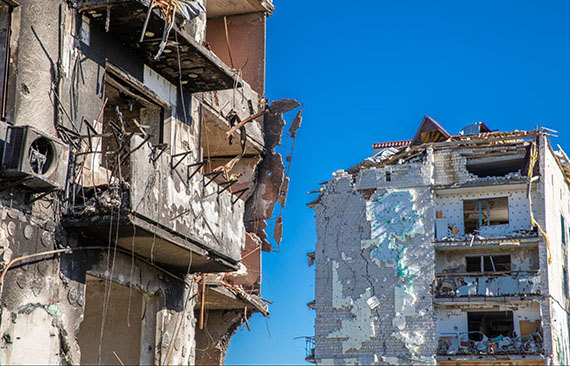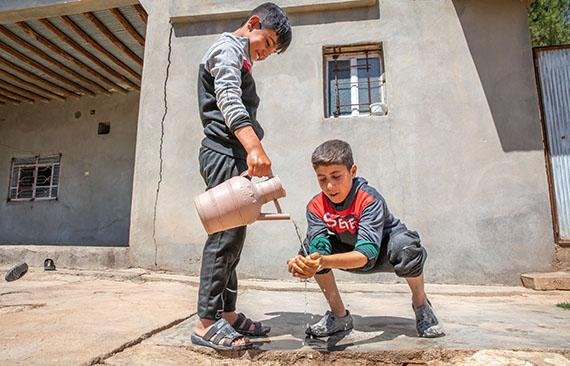|
The recent attacks in Ukraine targeted and destroyed critical infrastructure across major cities. This caused not only civilian casualties but also interrupted communities’ water, electricity, and gas supplies. Damage to essential utilities like water is too often an unjust outcome of war.

Buildings north of Kyiv in Ukraine that were damaged in the war.
"My kids got sick because of the contaminated water we used to buy from the tankers. I had to take them to the doctor, and some people from the village helped me to pay for the medicines," says a mother of eight children (name withheld for safety). Partnering with members of the community to rebuild the water purification system, Mercy Corps provided all required supplies — pumps, pipes, electrical panels, and check valves — and together, we drilled 24 electrical-powered boreholes to complete the project.

In Syria, two brothers wash their hands with water from a solar-powered sanitation system that was recently rehabilitated with Mercy Corps’ support.
Water security is a human right In 2010, the United Nations declared access to water and sanitation to be a human right. Yet, globally, one in three people do not have access to safe drinking water, two in five people are unable to access basic hand-washing facilities with soap and water, and 2 billion people are without toilets and latrines. Water security is one of Mercy Corps’ four outcome-focus areas, which also include: food security, livelihoods, and peace through good governance. The rehabilitated water sanitation system in Syria is just one of the many water, sanitation, and hygiene (WASH) programs that Mercy Corps supports to bring clean water to people around the world. When disaster and conflict arise, we provide access to lifesaving WASH services to ensure people have their basic needs met. For people who are in the most vulnerable time of their lives, WASH is a foundation for recovery by providing access to what is most fundamental for human survival. As communities rebuild and recover, we mobilize resources and support partners to develop inclusive, sustainable, and climate-smart water systems.
Improved water access has enabled this Syrian mother to grow tomatoes, cucumbers, eggplants, okra, and peppers. Clean water means she is now able to cook for her family without worrying about contaminated water.
Building inclusive water systems means including the voices of women and girls — who are disportionately impacted by water insecurity. Women and girls are often responsible for collecting water and may have to devote much of their day to the task. That’s why, from the first planning stages of any response, our WASH team members consult with women and girls in the community. Partnering with communities — and the most marginalized among them — enables the development of water systems that allow families to cope, adapt, and thrive in the face of crisis. Sincerely, The Mercy Corps team P.S. From the war in Ukraine to drought in Somalia to flooding in Pakistan, many families are living in the midst of crisis right now. Will you make your very first gift today and join our global community of changemakers?
|

|
|||||||||||